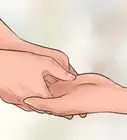This article was written by Luna Rose. Luna Rose is an autistic community member who specializes in writing and autism. She holds a degree in Informatics and has spoken at college events to improve understanding about disabilities. Luna Rose leads wikiHow's Autism Project.
wikiHow marks an article as reader-approved once it receives enough positive feedback. In this case, 86% of readers who voted found the article helpful, earning it our reader-approved status.
This article has been viewed 75,682 times.
To neurotypicals, fireworks are a fun way to celebrate a holiday. If you're an autistic person, however, the noise can be really disruptive. You're not alone—an article published in Neuroscience & Biobehavioral Reviews states that as many as 70% of autistic people have a decreased tolerance to loud sounds.[1] Fortunately, we have tips on how to fight the noise, get some sleep, and remain calm despite the earthshaking noises around you.
Steps
Reducing Noise
-
1Put in earplugs. Basic foam earplugs can block around 30 decibels of sound, which can help take the edge off of the noisy fireworks.
-
2Wear ear protection earmuffs. These heavy headphones were designed for working with leaf blowers and other loud equipment, and they block around 20-30 decibels (depending on the brand). These can be useful for walking or sitting, but will result in a sweaty head if you wear them overnight. Keep in-mind that these only reduce sounds to lower levels, such as 25 decibels. You will still be able to hear your surroundings but the sound would be reduced..Advertisement
-
3Play white noise. You can get white noise apps for your phone or laptop, or visit a white noise website.[2] The static sound will drown out other noises, and you can raise the volume to what is comfortable to you.
- White noise, like other noise, can damage your hearing if it is too loud. You may not notice it because it fades into the background after a while. Wear ear protection if you turn the volume up high.
-
4Go to an interior room of your house. A room on the inside of the building will be farther removed from the noise. A basement can have a similar effect. Find the quietest room and set up something to do in there.
-
5Use cloth to block sound. Pillows and blankets can muffle noise. Try lining the wall with pillows, drawing the curtains, and hanging a thick blanket over the curtain rod. A body pillow next to your head at bedtime can be especially effective.
Sensory Activities
Some autistic people find it calming to do a variety of sensory activities. Here are some different things you can try to help you relax.
-
1Get deep pressure. Curl up under a weighted blanket, or stack heavy objects on yourself (safely, and with help if needed). It might help to make your bed the old fashioned way, with tightly tucked in sheets and proper blankets instead of the usual duvet. Once you get into bed, the bed clothes might feel nice and tight and comforting. There are other things that can help too, such as:[3]
- Asking for a back rub
- Putting on lotion
- Using a massage toy
- Asking for a tight hug
- Wearing a compression vest, or heavy clothing
- Giving yourself a hand massage
-
2Move repetitively. Swinging or rocking in a rocking chair provides vestibular input in a very repetitive manner, similar to stimming. You may find that you feel more centered and ready to handle challenging situations afterwards.
-
3Do heavy work. There are all sorts of heavy work possibilities—doing chores, stirring cookie dough, carrying children, playing pushing or pulling games, and more.[4]
-
4Take a warm bath. Heat can be very calming, and bathing itself can be a relaxing experience. Try using a bath bomb or sweet-smelling soaps, and dimming the lights a little to give your eyes a break.
- Cuddling and heating pads are other ways to feel warmth.
-
5Play relaxing music.[5] This may not always help, but give it a try and see if it works. Try piano music, soft jazz, or music designed specifically for relaxation. Don't hesitate to search video websites for good music.
-
6Get outdoors before the fireworks start. Being with nature can calm you down, and walking provides light exercise that is good for your brain. Choose a walking route that involves as much nature as possible.
- Tell someone before leaving the house, so no one wonders where you're going.
- Take extra safety precautions if you are a woman, person of color, or visibly LGBT+ person. This is especially important if it is getting dark.
-
7Snuggle. Enlist the help of a pet or loved one to get some quality cuddling time. In addition to warmth and tactile input, it can help with relaxation and bonding. Try curling up on a soft bed or couch together.
-
8Stim a lot. Bring out your favorite stim toys and stim as much as you need to. Your body is telling you what it needs, so it's important to follow your instincts and stim as needed.
Staying Calm
If fireworks put you on edge, it might be helpful to do some relaxing activities.
-
1Stay away from stressful activities for the day. This doesn't only apply to work—also avoid challenging sensory situations, people who make you feel on edge, or activities that are difficult for you. You're dealing with loud and painful sounds—you don't need anything else on your plate.
-
2Harness the power of your special interests. This can help you get into a zone and pass the time quickly. Try starting a fun project you've been looking forward to, talking with people (in person or online) who share your interest, or researching your favorite things.
-
3Use relaxation techniques. Think of the exercises that have been most helpful to you, and spend 5 or 10 minutes focusing on them. Whenever you find your thoughts wandering back to worries, gently guide them back to your exercise. Here are some ideas to try:
- Meditation
- EMDR techniques
- Imagery
- Engaging the senses (besides hearing)
- Progressive muscle relaxation
- Breathing
-
4Spend time with people who make you happy. Go to people who make you feel less stressed, and focus on them. Ask them about their day, or what is on their mind. If they're doing something, see if you can help. They can help distract you and make you feel a bit better.
-
5Have medication ready as a last resort, if needed. For disorders such as panic attacks, you may have been described anti-anxiety medications such as Xanax. Use this if you feel that a panic attack or severe stress is imminent. A small or moderate dosage may return you to a neutral mood.
-
6Try positive self-talk. This technique helps some people de-stress. Remind yourself that you are capable and resourceful. Power pose in front of the mirror, give yourself a smile, and remind yourself that while the situation is tough, you're tough too.
- "I'm relaxed and feeling peaceful. While fireworks startle me, I can breathe deeply and go back to feeling calm. I think I'll have a good night's sleep tonight."
- "I'm doing my best in a difficult situation. It stresses me out a little, and I'm allowed to be stressed. I know I'll be okay in the end."
- "I'm a resourceful woman. I've employed several noise-reduction techniques, and if I need more, I can get more. I can ride out this night and enjoy the fireworks."
- "I'm a strong person. Fireworks will not ruin my night."
-
7Talk about your feelings to a good listener. If you're really feeling stressed, find a person who has been helpful to you in the past, and say "I'm having a rough time. Is now a good time to talk?" If so, they may be able to reassure you and help you feel a little better.
- If you don't have anyone available, some apps like Wysa can also help you cope with anxiety and stress.
-
8Take control. You can't manage your neighbors' fireworks, but you can play a role in your family's fun. Having power over the fireworks, and knowing when they will go off, can help you feel less anxious about them. Here are ways to achieve this at any age:
- Help your family buy fireworks that look interesting to you.
- Choose which fireworks to set off next
- Light the firework
- Give the countdown for a loved one to light the next firework
-
9Enjoy the pretty lights. While the noise may not be fun, the lights can be interesting to watch. Check out the bright colors and various shapes. Discuss them with your family members if your ear protection allows. Fireworks have their drawbacks, and they also have their beauty.
References
- ↑ https://www.sciencedirect.com/science/article/abs/pii/S0149763420306722
- ↑ Simply Noise (contains white, pink, and brown noise
- ↑ Sensory Smarts: Sensory Diet Activities
- ↑ School OT: Sensory Diet "Menu" Activities and Strategies to Try
- ↑ Health Central: Anxiety Caused by Noise
- Article started by an autistic editor with plenty of experience handling loud noise



















































































Medical Disclaimer
The content of this article is not intended to be a substitute for professional medical advice, examination, diagnosis, or treatment. You should always contact your doctor or other qualified healthcare professional before starting, changing, or stopping any kind of health treatment.
Read More...